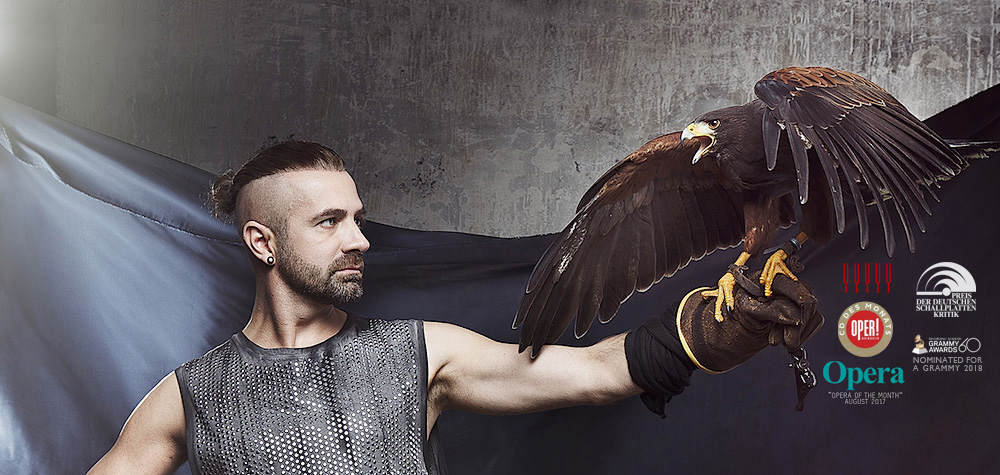Ottone
G. F. Handel
In 1719 the Royal Academy of Music was founded by Royal Charter to properly establish Italian opera productions on the London stage. Handel had been living permanently in or near London for seven years, and was appointed by the board of directors as the company’s ‘Master of the Orchester’. In addition to agreeing to provide operas and direct the orchestra, he was instructed by the Lord Chamberlain “to repair to Italy Germany or such other Place or Places as you shall think proper, there to make Contracts with such Singer or Singers as you judge fit to perform on the English stage.”
Handel travelled to Dresden, where he recruited the castrato Senesino, the soprano Margherita Durastanti and the bass Giuseppe Maria Boschi. Head-hunting these prestigious singers was not Handel’s only significant benefit from his trip to Dresden: whilst there he probably attended a performance of Antonio Lotti’s Teofane (produced in September 1719 to celebrate the marriage of the Crown Prince of Saxony and Poland to the Archduchess of Austria); he subsequently borrowed musical ideas from Lotti’s score in several works, and also he probably acquired a copy of the libretto by the court poet Stefano Benedetto Pallavicini. The historical basis for the fictitious plot is the dynastic marriage between the German king Otho and the Byzantine princess Theophanu, which took place in Rome on 14 April 972. Having created a political alliance between the Eastern and Western empires, Otho was consequently crowned emperor a year later. The events in Pallavicini’s drama take place in and around Rome shortly before the marriage is due to take place.
Three years after Lotti’s Teofane, Pallavicini’s libretto was adapted by Nicola Francesco Haym for Handel’s Ottone, which was the first new opera to be produced during the Royal Academy of Music’s fourth season (1722/23). Numerous aria and duet texts were preserved from Pallavicini’s original Dresden libretto (sometimes with minor modifications), but four characters were eliminated, recitatives were abridged by almost a third, and many key points in the drama featured new aria texts. Handel signed and dated his completed score on 10 August 1722, in advance of the forthcoming season, but he then revised it at least twice before the opera was first performed at the King’s Theatre on the Haymarket on 12 January 1723. The company featured three singers who had sung the same characters in Lotti’s setting at Dresden: Senesino (Ottone), Durastanti (Gismonda) and Boschi (Emireno). The cast was completed by Anastasia Robinson (Matilda) and Gaetano Berenstadt (Adelberto), and it marked the London debut of the prima donna Francesca Cuzzoni (Teofane).
Ottone had an especially complicated creative process. Some extensive adjustments probably arose from Handel’s collaboration with Cuzzoni, who arrived in London in December 1722, about a fortnight before the first performance; several arias relating to her role were rejected and substituted with entirely different new music. According to Mainwaring’s Memoirs of the Life of the late George Frideric Handel (1760), there was tension between the maestro and his new diva concerning her first aria to be sung on the London stage:
Having one day some words with Cuzzoni on her refusing to sing Falsa imagine in Ottone; Oh! Madame, (said he) je sçais bien que Vous êtes une veritable Diablesse: mais je Vous ferai sçavour, moi, que je suis Beelzebub le Chéf des Diables. [“I know very well that you are a veritable she-devil: but I will show you that I am Beelzebub the Chief of the Devils”] With this he took her up by the waist, and, if she made any more words, swore that he would fling her out of the window. It is to be noted, that this was formerly one of the methods of executing criminals in some parts of Germany; a process not unlike that of the Tarpeian rock[.]
The story illuminates the creative tensions between a composer’s intentions and a singer’s priorities: instead of creating a flashy showpiece out of keeping with the dramatic situation, ‘Falsa imagine’ (I.iii) is a gentle slow aria of heartfelt simplicity, accompanied by only continuo until its bittersweet closing ritornello for strings; it astutely characterizes Teofane’s disappointment upon meeting the man she thinks she must marry. Handel’s forcible insistence on his artistic vision being respected by Cuzzoni paid off handsomely in the end. Nevertheless, he seems to have placated his new prima donna elsewhere in the opera by adding several virtuosic arias that were not part of his initial conception. The composer’s manifold alterations during the opera’s preparation were by no means confined to Cuzzoni’s part: a total of eleven arias and one duet were finished but then discarded and replaced before the first performance, and several other arias were considerably revised. In addition to rejections, redrafts of scenes and wholesale substitutions by Handel during the opera’s composition and preparation, further amendments were also made during its first run. Moreover, he replaced and also added several extra arias for the twelfth performance, which took place on 26 March 1723 after a break of more than five weeks because of Lent. Designated as a benefit night for Cuzzoni, Handel created substitutions and additional new material for all principal members of the cast. For the most part, Il Pomo d’Oro presents the version of the opera given by Handel at the first performance, but some of his alterations for Cuzzoni’s benefit night are incorporated, most notably Teofane’s aria ‘Spera sì, mi dice il core’ (added to the start of II.v); this was nicknamed in Handel’s circle as ‘The Pigeon Song’ because whenever his supporter Elizabeth Legh played it at her harpsichord, a pigeon would fly across from a nearby dovecote and express its delight at the music – and yet apparently the bird showed no comparable reaction to any other piece of music.
© David Vickers (2017)
Download
Cast
Ottone: Max Emanuel Cencic *
Teofane: Lauren Snouffer * | Dilyara Idrisova
Emireno: Pavel Kudinov *
Gismonda: Ann Hallenberg *
Adalberto: Xavier Sabata *
Matilda: Anna Starushkevych *
conductor: George Petrou *
orchestra: Il Pomo d’Oro *
* CD-recording









